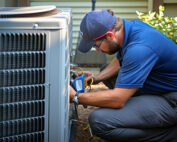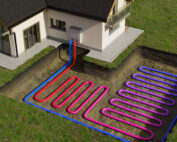When it comes to keeping your home comfortable, terms like AC and HVAC often come up. But what exactly do they mean? AC vs. HVAC: What’s the Difference? Understanding these distinctions is crucial, especially when you’re making decisions about your home’s heating and cooling needs. At Will Air, LLC, we frequently get asked this question, and in this article, we’ll break down the differences between AC and HVAC to help you make informed choices.
Understanding AC (Air Conditioning)
Air conditioning, or AC, specifically refers to the system that cools the air in your home. It’s designed to lower the temperature and humidity levels, making your indoor environment more comfortable during the hot summer months. AC units come in various forms, including window units, split systems, and central air conditioning systems. While all these systems perform the same basic function—cooling your home—they vary in terms of installation, cost, and efficiency.
Window units are typically the most affordable and easiest to install. However, they are only suitable for cooling small spaces. Split systems, which consist of an outdoor compressor and an indoor unit, offer a more efficient solution for cooling larger areas or multiple rooms. Central air conditioning is the most comprehensive solution, providing cooling to an entire home through a network of ducts and vents.
While an AC unit is an essential component of home comfort, it only addresses cooling needs. This limitation is where HVAC systems come into play.
What Does HVAC Include?
HVAC stands for Heating, Ventilation, and Air Conditioning. Unlike an AC unit, which only cools, an HVAC system is designed to provide both heating and cooling. HVAC systems also play a vital role in ventilating your home. They circulate fresh air and remove stale air to improve indoor air quality. Essentially, an HVAC system is a complete package that handles all your climate control needs.
There are different types of HVAC systems, including split systems, hybrid systems, ductless systems, and packaged heating and air conditioning systems. Each type has its unique features and benefits. But all are designed to manage the temperature, humidity, and air quality in your home year-round. Whether it’s the middle of summer or the dead of winter, an HVAC system ensures that your home remains comfortable.
Key Differences Between AC and HVAC
So, what’s the difference between AC and HVAC? The key difference lies in the scope of their functions. AC refers specifically to air conditioning, which is just one part of what an HVAC system does. HVAC systems encompass not only air conditioning but also heating and ventilation, making them a more comprehensive solution for home climate control.
Another critical difference is the components involved. While an AC system typically includes just the air conditioner and its associated parts, an HVAC system includes additional components like a furnace or heat pump for heating, as well as ductwork and air filters for ventilation. This difference in components means that HVAC systems are generally more complex and require more maintenance than standalone AC units.
Which One Is Right for You?
Choosing between an AC unit and an HVAC system depends on your specific needs and the climate in which you live. If you only need cooling during the summer, a standalone AC unit might suffice. However, if you live in an area with both hot summers and cold winters, an HVAC system is likely the better choice. HVAC systems not only offer the flexibility of year-round climate control but also tend to be more energy-efficient in the long run. This efficiency can potentially save you money on utility bills.
Moreover, HVAC systems are often more convenient. They combine heating, cooling, and ventilation into one system, controlled by a single thermostat. This integration can make your home’s climate control easier to manage and more efficient.
Energy Efficiency and Cost Considerations
Energy efficiency is another critical factor to consider when deciding between AC and HVAC systems. Modern HVAC systems are designed with energy efficiency in mind. They often feature high SEER (Seasonal Energy Efficiency Ratio) ratings for cooling and AFUE (Annual Fuel Utilization Efficiency) ratings for heating. These ratings indicate how efficiently the system converts energy into cooling or heating.
While HVAC systems typically have a higher upfront cost due to their complexity and additional components, they can offer long-term savings through reduced energy bills and fewer maintenance issues. Additionally, many HVAC systems are compatible with smart thermostats, allowing for even greater control over your home’s climate and further optimizing energy usage.
In summary, the primary difference between AC and HVAC lies in the range of functions they offer. AC systems are focused solely on cooling, making them suitable for homes in warmer climates or for those who only need cooling. HVAC systems, on the other hand, offer a complete climate control solution by providing heating, ventilation, and air conditioning. While HVAC systems are more complex and expensive, their comprehensive capabilities and energy efficiency make them an excellent long-term investment.
At Will Air, LLC, we’re here to help you determine the best solution for your home. Whether you’re considering a new AC unit or an HVAC system, our team of experts is ready to assist you with installation, maintenance, and any questions you may have. Contact us today to learn more about our services and how we can keep your home comfortable all year round.
Hot Topics
Recent Posts
What Is Duct Cleaning and Why Do You Need It?
When was the last time you had your air ducts cleaned? If you can’t remember—or [...]
Top Maintenance Tips to Save Energy This Winter
As temperatures drop, homeowners and businesses rely heavily on their heating systems to stay comfortable. [...]
How Do Geothermal HVAC Systems Work?
Geothermal HVAC systems are gaining popularity as a sustainable alternative to traditional heating and cooling [...]
Maintain HVAC Efficiency During Extreme Weather
Extreme weather can challenge your HVAC system, pushing it to work harder than usual. Knowing [...]







